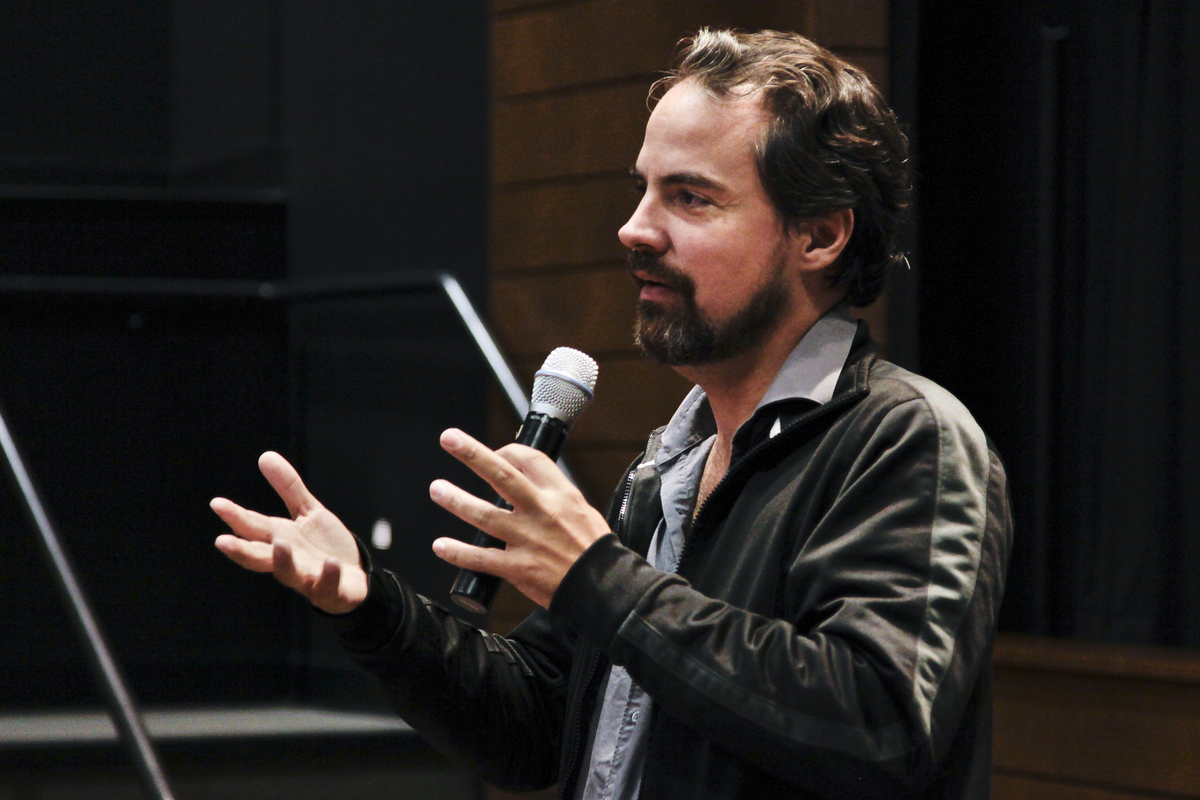Student films to be screened at Nelson Institute’s ‘Tales from Planet Earth’

Interdisciplinary Artist in Residence Alex Rivera is teaching students that learning to communicate through film can be beneficial in any major. Rivera is teaching a class on environmental filmmaking.
Photo: Kait Vosswinkel
A collaborative class on environmental filmmaking is helping some UW–Madison students learn to tell stories in a whole new way.
By combining group discussion with hands-on production, New York-based filmmaker and digital artist Alex Rivera teaches students in his “Ecotopia to Ecopocalypse” course that learning to communicate through film can be beneficial in any major.
“Filmmaking is usually viewed as a specialty and something that’s put in a film program,” says Rivera. “That’s strange in this moment because we’re all collecting so many moving images. I think it’s important that everybody have experience … not just taking photos of a wedding or videos of a friend, but really working through what it means to tell a story through pictures and sound.”
Rivera came to Madison through the Arts Institute Interdisciplinary Artist in Residence Program. While he never thought of himself as an environmental filmmaker, his work often highlights relationships between immigrant communities, land and resources.
“What we’ve been trying to do … is to use film as a way for people to rethink what they might conceive of as the environment and fundamentally see that most of the environmental problems we wrestle with today are also problems about social justice.”
Gregg Mitman
Working alongside History of Science Professor Gregg Mitman, Rivera leads students in producing films to be screened at the Nelson Institute’s “Tales from Planet Earth Film Festival,” to be held Friday, Nov. 1 through Sunday, Nov. 3. Mitman founded the festival in 2007 as a way to use film in community engagement and think critically about environmental issues.
“What we’ve been trying to do with ‘Tales From Planet Earth’ is to use film as a way for people to rethink what they might conceive of as the environment and fundamentally see that most of the environmental problems we wrestle with today are also problems about social justice,” says Mitman. “That’s where Alex’s work comes in.”
History of science graduate student Melissa Charenko says she joined Rivera’s class with no film experience, looking for ways to broaden the audience for her work. While the project involves learning how to operate a camera and edit for a finished product, Charenko says filmmaking is about much more than technical skills.
“It’s about connecting with people in the wider community to learn about their stories,” she says. “It’s about imagining the future and sharing a vision of it. It’s about stories, human connections and communicating with others.”
Rivera’s students came prepared on the first day with an area of environmental concern. After collecting a story from someone knowledgeable on that topic, they worked to transpose that story into the future.
Rivera says that using science fiction in his own work, like “Sleep Dealer,” creates a space to gather and visualize what could be. This, he says, is necessary before any real change can be made.
“It’s … really exciting to think of the lights going down and my work starting to play. I’m curious to see how people will react.”
Melissa Charenko
“If there’s no transformation in the narrative first,” says Rivera, “there can be no transformation in the material world.”
As co-director of a books-to-prisoners project, Charenko wanted to play with the idea of freedom, using the iconic environmental image of national parks.
“My film imagines a man who wanted to visit a national park with his son,” she says. “They’re caught sipping water from a river in the park while out hiking, a crime that carries a severe punishment in a world where water is increasingly scarce. It’s meant to talk about prison conditions and resource use, and to comment on the pristine nature of national parks and the privileged access to them.”
Nelson Institute Ph.D. candidate Peter Boger took a similar course called “Green Screen” with filmmaker Judith Helfand during the first year of the festival in 2007. While interested specifically in bringing environmental stories to a wider audience, Boger agrees with Rivera that understanding film is an important skill in any discipline.
“More and more, the future of communication is digital and multimedia, and film has the power to connect people to ideas and put a face and a story to otherwise abstract theories that people claim.”
Charenko is nervous, but excited about her film’s festival premiere.
“Most of my class projects are only shared with a handful of people at best,” she says. “At the same time, it’s also really exciting to think of the lights going down and my work starting to play. I’m curious to see how people will react.”




